新概念英语第三册Lesson 21 Daniel Mendoza•课件(共24张PPT)
文档属性
| 名称 | 新概念英语第三册Lesson 21 Daniel Mendoza•课件(共24张PPT) | 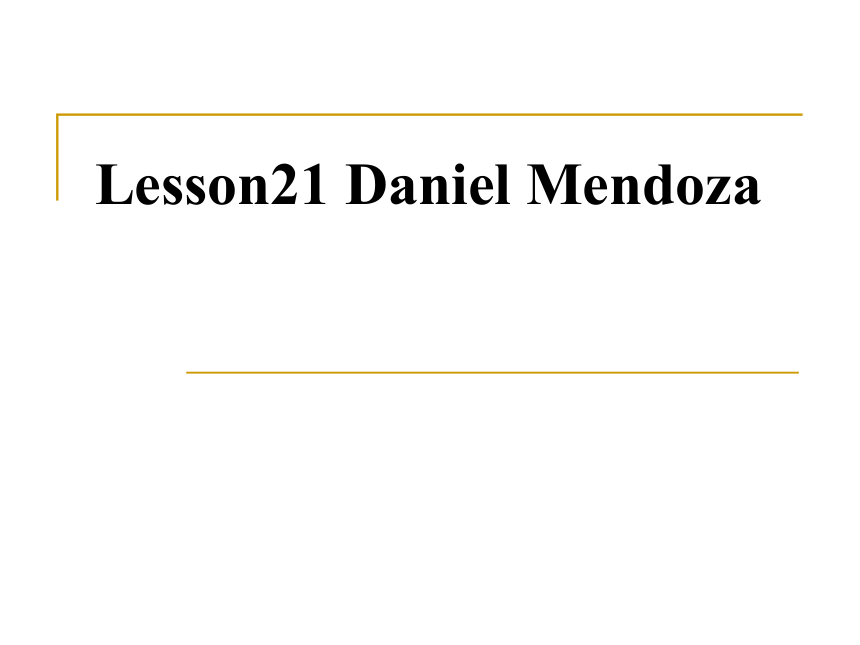 | |
| 格式 | pptx | ||
| 文件大小 | 86.0KB | ||
| 资源类型 | 教案 | ||
| 版本资源 | 新概念英语 | ||
| 科目 | 英语 | ||
| 更新时间 | 2024-02-20 20:01:46 | ||
图片预览

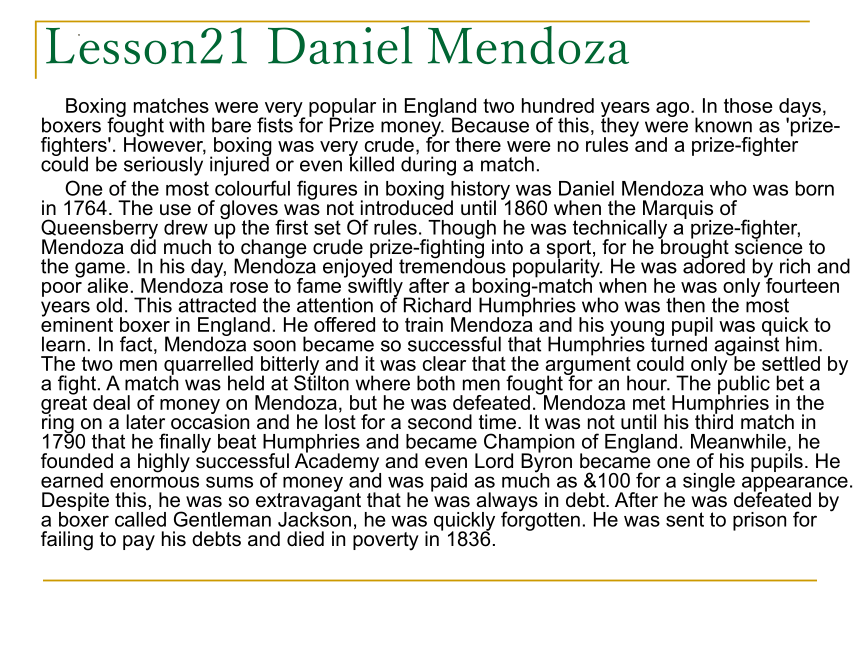
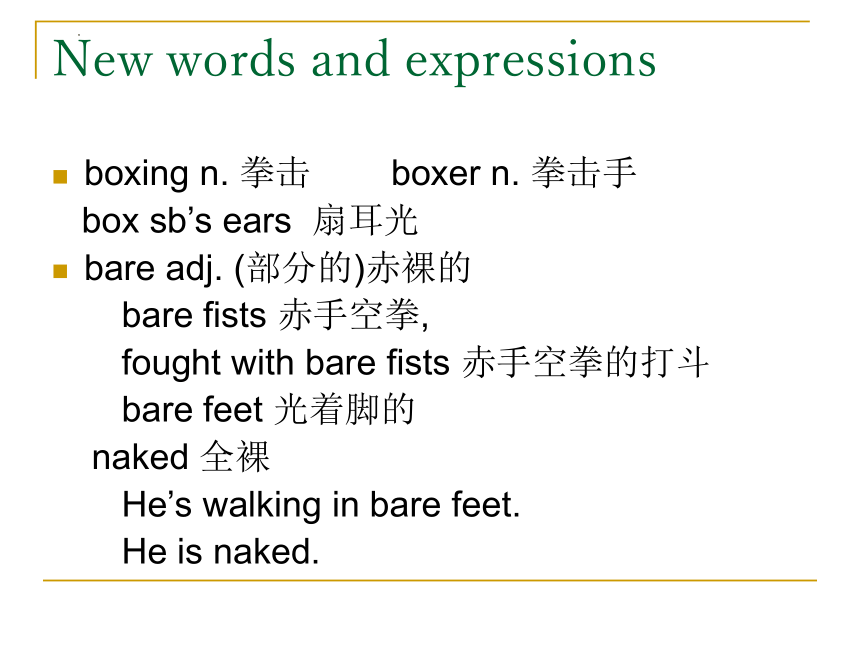
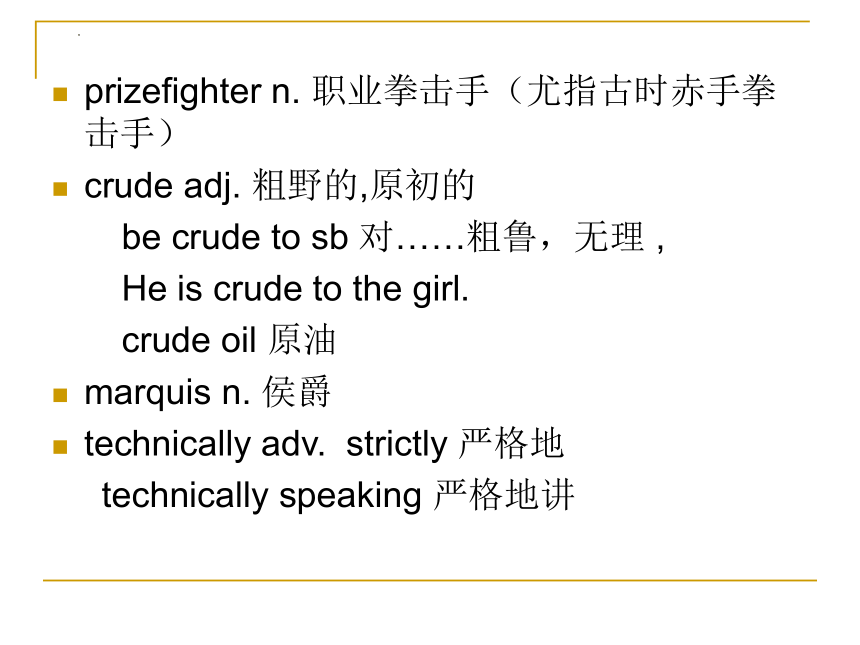
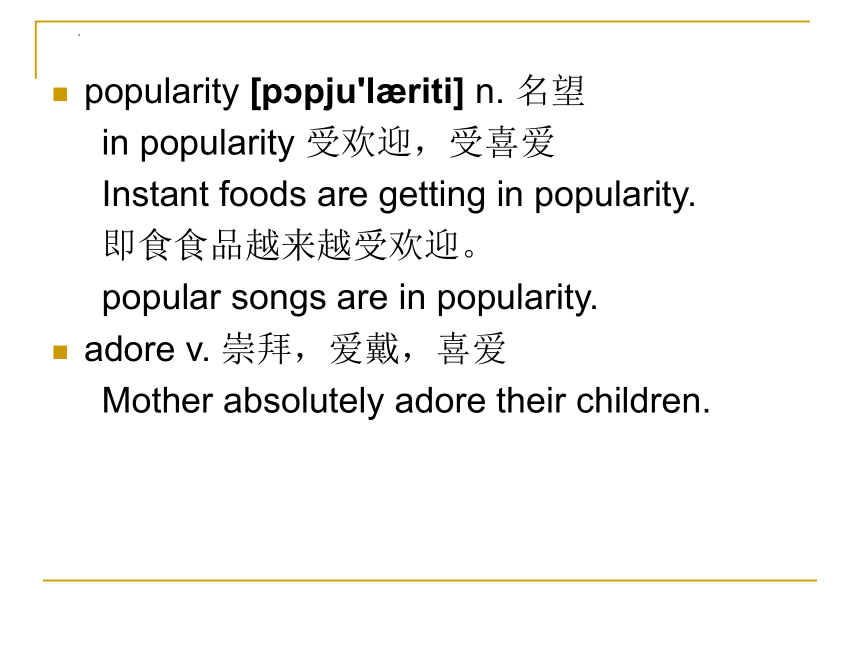
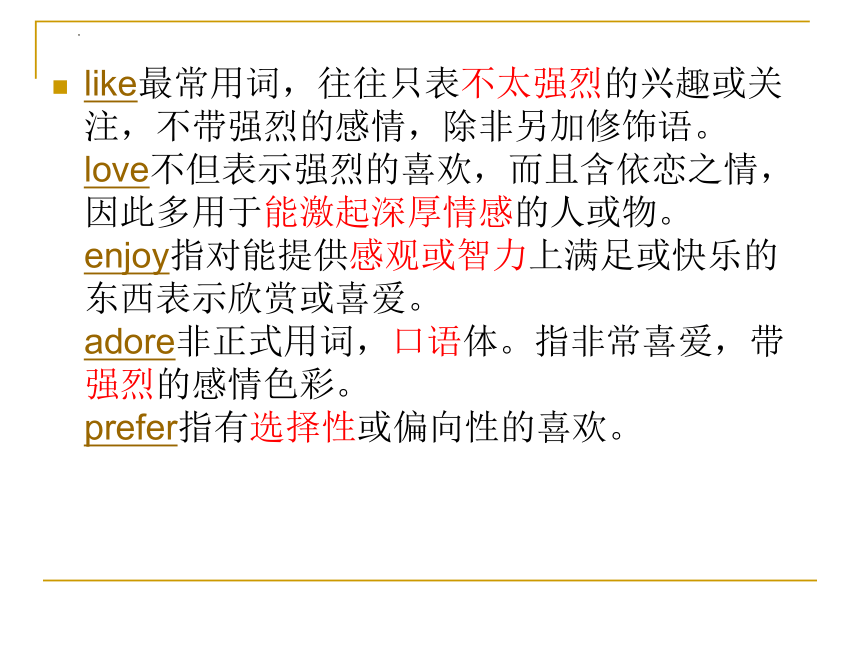
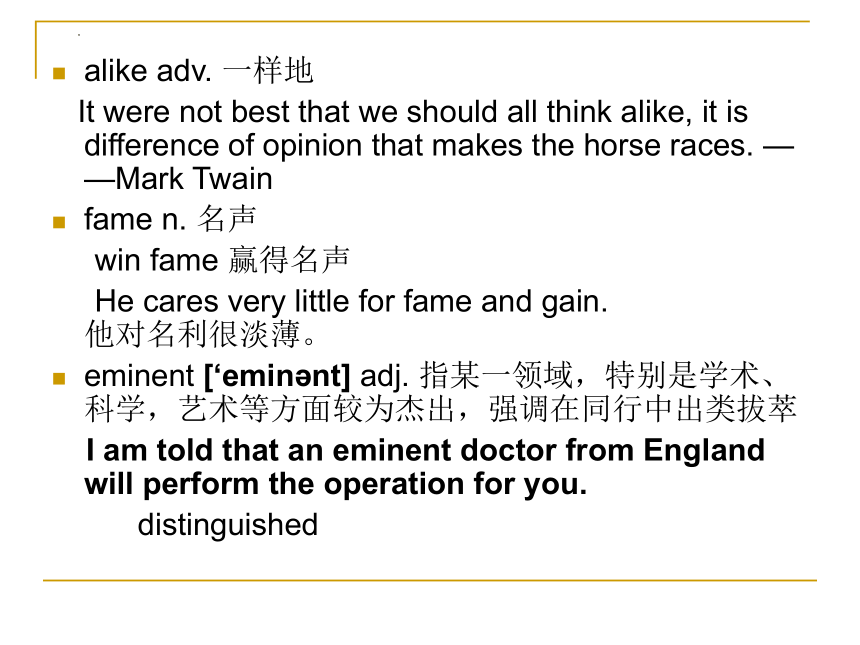
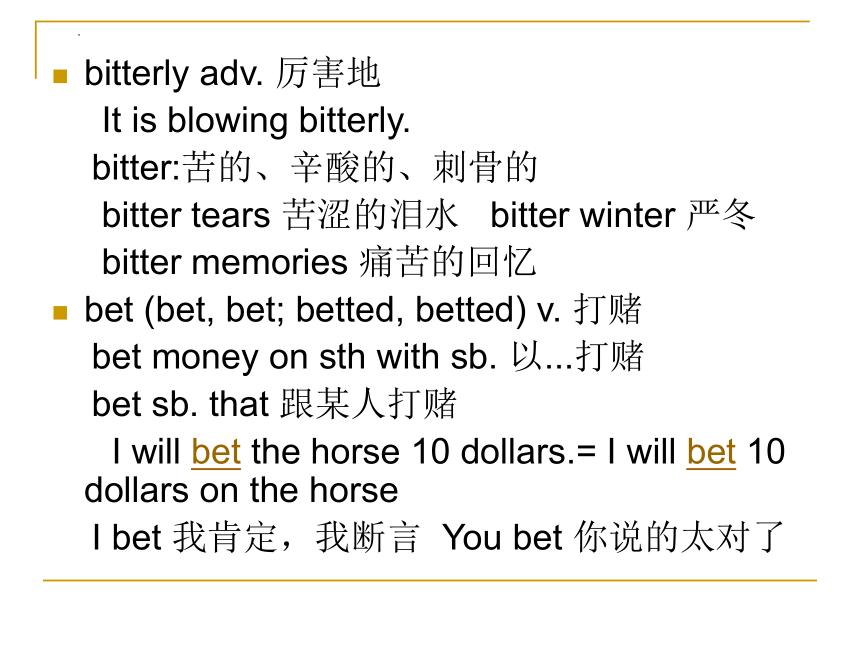
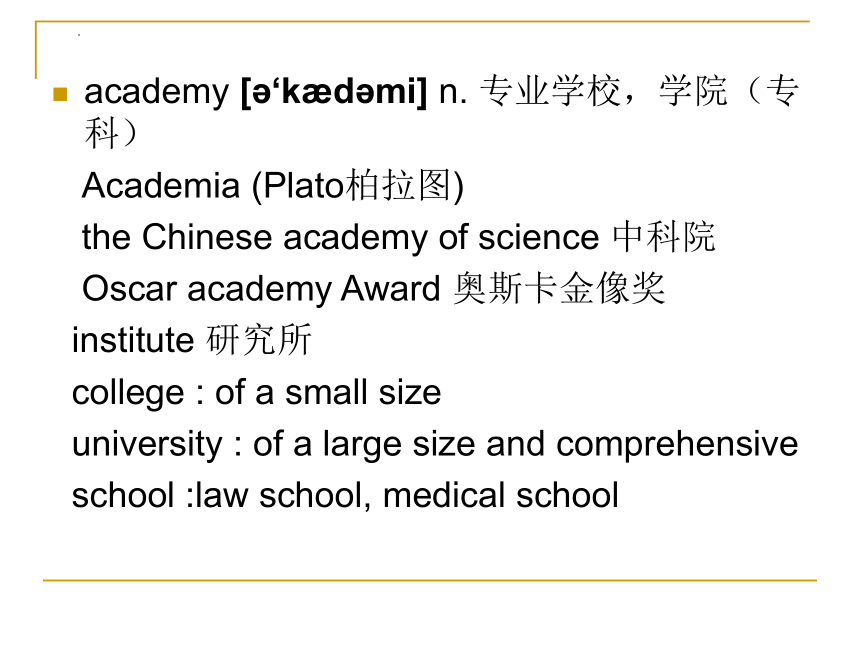
文档简介
(共24张PPT)
Lesson21 Daniel Mendoza
Lesson21 Daniel Mendoza
Boxing matches were very popular in England two hundred years ago. In those days, boxers fought with bare fists for Prize money. Because of this, they were known as 'prize-fighters'. However, boxing was very crude, for there were no rules and a prize-fighter could be seriously injured or even killed during a match.
One of the most colourful figures in boxing history was Daniel Mendoza who was born in 1764. The use of gloves was not introduced until 1860 when the Marquis of Queensberry drew up the first set Of rules. Though he was technically a prize-fighter, Mendoza did much to change crude prize-fighting into a sport, for he brought science to the game. In his day, Mendoza enjoyed tremendous popularity. He was adored by rich and poor alike. Mendoza rose to fame swiftly after a boxing-match when he was only fourteen years old. This attracted the attention of Richard Humphries who was then the most eminent boxer in England. He offered to train Mendoza and his young pupil was quick to learn. In fact, Mendoza soon became so successful that Humphries turned against him. The two men quarrelled bitterly and it was clear that the argument could only be settled by a fight. A match was held at Stilton where both men fought for an hour. The public bet a great deal of money on Mendoza, but he was defeated. Mendoza met Humphries in the ring on a later occasion and he lost for a second time. It was not until his third match in 1790 that he finally beat Humphries and became Champion of England. Meanwhile, he founded a highly successful Academy and even Lord Byron became one of his pupils. He earned enormous sums of money and was paid as much as &100 for a single appearance. Despite this, he was so extravagant that he was always in debt. After he was defeated by a boxer called Gentleman Jackson, he was quickly forgotten. He was sent to prison for failing to pay his debts and died in poverty in 1836.
New words and expressions
boxing n. 拳击 boxer n. 拳击手
box sb’s ears 扇耳光
bare adj. (部分的)赤裸的
bare fists 赤手空拳,
fought with bare fists 赤手空拳的打斗
bare feet 光着脚的
naked 全裸
He’s walking in bare feet.
He is naked.
prizefighter n. 职业拳击手(尤指古时赤手拳击手)
crude adj. 粗野的,原初的
be crude to sb 对……粗鲁,无理 ,
He is crude to the girl.
crude oil 原油
marquis n. 侯爵
technically adv. strictly 严格地
technically speaking 严格地讲
popularity [p pju'l riti] n. 名望
in popularity 受欢迎,受喜爱
Instant foods are getting in popularity.
即食食品越来越受欢迎。
popular songs are in popularity.
adore v. 崇拜,爱戴,喜爱
Mother absolutely adore their children.
like最常用词,往往只表不太强烈的兴趣或关注,不带强烈的感情,除非另加修饰语。
love不但表示强烈的喜欢,而且含依恋之情,因此多用于能激起深厚情感的人或物。
enjoy指对能提供感观或智力上满足或快乐的东西表示欣赏或喜爱。
adore非正式用词,口语体。指非常喜爱,带强烈的感彩。
prefer指有选择性或偏向性的喜欢。
alike adv. 一样地
It were not best that we should all think alike, it is difference of opinion that makes the horse races. ——Mark Twain
fame n. 名声
win fame 赢得名声
He cares very little for fame and gain.
他对名利很淡薄。
eminent [‘emin nt] adj. 指某一领域,特别是学术、科学,艺术等方面较为杰出,强调在同行中出类拔萃
I am told that an eminent doctor from England will perform the operation for you.
distinguished
bitterly adv. 厉害地
It is blowing bitterly.
bitter:苦的、辛酸的、刺骨的
bitter tears 苦涩的泪水 bitter winter 严冬
bitter memories 痛苦的回忆
bet (bet, bet; betted, betted) v. 打赌
bet money on sth with sb. 以...打赌
bet sb. that 跟某人打赌
I will bet the horse 10 dollars.= I will bet 10 dollars on the horse
I bet 我肯定,我断言 You bet 你说的太对了
academy [ ‘k d mi] n. 专业学校,学院(专科)
Academia (Plato柏拉图)
the Chinese academy of science 中科院
Oscar academy Award 奥斯卡金像奖
institute 研究所
college : of a small size
university : of a large size and comprehensive
school :law school, medical school
poverty ['p v ti] n. 贫困
in poverty 在贫困当中 live in poverty
Poverty of speech is the outward evidence of poverty of mind.语言贫乏说明头脑空虚
extravagant [iks'tr v g nt] adj. 浪费的,奢侈
extravagant habit
be extravagant with :Don’t be extravagant with water
Text Study
Boxing matches were very popular in England two hundred years ago.
match (有输赢结果的)比赛
game (有规则的)比赛
the Asian Games ; the Olympic Games
contest (由评委评出结果)的比赛
a beauty contest
In those days, boxers fought with bare fists for Prize money. Because of this, they were known as 'prize-fighters'.
fight for 为…而奋斗
fight for the independence of the nation
fight against 与…抗争
fight against one’s fate 与命运做斗争
because of this=due to this=owing to this=on account of this
However, boxing was very crude, for there were no rules and a prizefighter could be seriously injured or even killed during a match. One of the most colourful figures in boxing history was Daniel Mendoza who was born in 1764.
be seriously injured be slight injured
one of the most colourful figures = one of the most famous people 引人注目的人物
The use of gloves was not introduced until 1860 when the Marquis of Queensberry drew up the first set of rules.
Introduce sth into/from 引入
Potatoes were introduced into Europe from South America.
draw up 起草
draw up a contract 起草一份合同
a set of rules 一套规则
Though he was technically a prizefighter, Mendoza did much to change crude prize-fighting into a sport, for he brought science to the game
did much/little to do sth 为…做了很多/少工作
Mr Deng did much to improve the people’s living standard.
change into 把…变成…
bring…to… 引进,带入
bring the fact to light 公诸于世
bring tears to eyes 热泪盈眶
In his day, Mendoza enjoyed tremendous popularity. He was adored by rich and poor alike.
In his day 在他的鼎盛时期
tremendous [tr ‘m nd s] 极大地,巨大的
alike adj (表语)相似的 look alike
adv in a similar way
I learned a lot from teacher and students alike.我从老师和同学那里同样学的很多东西。
Mendoza rose to fame swiftly after a boxing-match when he was only fourteen years old. This attracted the attention of Richard Humphries who was then the most eminent boxer in England.
rose to fame 名声鹊起=become famous
rise to power=become powerful
attract/draw/occupy/arrest/capture/win one’s attention 吸引某人注意
then 当时,前置强调作用
He offered to train Mendoza and his young pupil was quick to learn. In fact, Mendoza soon became so successful that Humphries turned against him. The two men quarreled bitterly and it was clear that the argument could only be settled by a fight.
offer to 主动提供
be quick/slow to learn
turn against 变得对…不满;背叛
The little boy turned against his mother after he got a newborn sister.
turn against one’s motherland
settle an argument 解决争端
A match was held at Stilton where both men fought for an hour. The public bet a great deal of money on Mendoza, but he was defeated. Mendoza met Humphries in the ring on a later occasion and he lost for a second time.
be defeated 失败= lose the match
meet 作战,交手,较量
met Humphries in the ring 在拳台交手
on a later occasion 还有一次
on an occasion 有一次 on this occasion 这一次 on occasion 偶尔,时不时的,不经常
It was not until his third match in 1790 that he finally beat Humphries and became Champion of England. Meanwhile, he founded a highly successful Academy and even Lord Byron became one of his pupils.
It was not until…that.. 直到….才
Champion 冠军 runner-up 亚军 3rd-place 季军
highly adv (抽象含义) a highly skilled worker
a highly developed society
high adv (实在含义)
按照英国传统,女王(或国王)可以根据内阁首相的提议,将某种贵族爵位授予某人,但受封的人数是有限的,每年大约在20名以内。
贵族爵位(peerages)分为
公爵(Duke) 侯爵(Marquis或Marquess)
伯爵(Earl) 子爵(Viscount)和
男爵(Baron) 5个等级。
侯爵、伯爵、子爵和男爵都可以称为“Lord”(勋爵)。
公爵、侯爵、伯爵的长子在他们的父亲没死之前,即没有继承其父亲爵位之前,也可称之为“Lord”(勋爵),但不是贵族。公爵、侯爵的次子以下的儿子,可以终身称之为“Lord”(勋爵);对伯、子、男爵的次子以下的儿子可称“Honorable”(尊敬的)。他们也都不是贵族。
He earned enormous sums of money and was paid as much as 100 for a single appearance. Despite this, he was so extravagant that he was always in debt.
as much as 多达
single adj 用来加强表达效果
despite this 尽管如此
be in debt 负债累累
be up to one’s chin in debt
After he was defeated by a boxer called Gentleman Jackson, he was quickly forgotten. He was sent to prison for failing to pay his debts and died in poverty in 1836.
be forgotten 被遗忘了 be left in the cold
be sent to prison 入狱
谢谢!
Lesson21 Daniel Mendoza
Lesson21 Daniel Mendoza
Boxing matches were very popular in England two hundred years ago. In those days, boxers fought with bare fists for Prize money. Because of this, they were known as 'prize-fighters'. However, boxing was very crude, for there were no rules and a prize-fighter could be seriously injured or even killed during a match.
One of the most colourful figures in boxing history was Daniel Mendoza who was born in 1764. The use of gloves was not introduced until 1860 when the Marquis of Queensberry drew up the first set Of rules. Though he was technically a prize-fighter, Mendoza did much to change crude prize-fighting into a sport, for he brought science to the game. In his day, Mendoza enjoyed tremendous popularity. He was adored by rich and poor alike. Mendoza rose to fame swiftly after a boxing-match when he was only fourteen years old. This attracted the attention of Richard Humphries who was then the most eminent boxer in England. He offered to train Mendoza and his young pupil was quick to learn. In fact, Mendoza soon became so successful that Humphries turned against him. The two men quarrelled bitterly and it was clear that the argument could only be settled by a fight. A match was held at Stilton where both men fought for an hour. The public bet a great deal of money on Mendoza, but he was defeated. Mendoza met Humphries in the ring on a later occasion and he lost for a second time. It was not until his third match in 1790 that he finally beat Humphries and became Champion of England. Meanwhile, he founded a highly successful Academy and even Lord Byron became one of his pupils. He earned enormous sums of money and was paid as much as &100 for a single appearance. Despite this, he was so extravagant that he was always in debt. After he was defeated by a boxer called Gentleman Jackson, he was quickly forgotten. He was sent to prison for failing to pay his debts and died in poverty in 1836.
New words and expressions
boxing n. 拳击 boxer n. 拳击手
box sb’s ears 扇耳光
bare adj. (部分的)赤裸的
bare fists 赤手空拳,
fought with bare fists 赤手空拳的打斗
bare feet 光着脚的
naked 全裸
He’s walking in bare feet.
He is naked.
prizefighter n. 职业拳击手(尤指古时赤手拳击手)
crude adj. 粗野的,原初的
be crude to sb 对……粗鲁,无理 ,
He is crude to the girl.
crude oil 原油
marquis n. 侯爵
technically adv. strictly 严格地
technically speaking 严格地讲
popularity [p pju'l riti] n. 名望
in popularity 受欢迎,受喜爱
Instant foods are getting in popularity.
即食食品越来越受欢迎。
popular songs are in popularity.
adore v. 崇拜,爱戴,喜爱
Mother absolutely adore their children.
like最常用词,往往只表不太强烈的兴趣或关注,不带强烈的感情,除非另加修饰语。
love不但表示强烈的喜欢,而且含依恋之情,因此多用于能激起深厚情感的人或物。
enjoy指对能提供感观或智力上满足或快乐的东西表示欣赏或喜爱。
adore非正式用词,口语体。指非常喜爱,带强烈的感彩。
prefer指有选择性或偏向性的喜欢。
alike adv. 一样地
It were not best that we should all think alike, it is difference of opinion that makes the horse races. ——Mark Twain
fame n. 名声
win fame 赢得名声
He cares very little for fame and gain.
他对名利很淡薄。
eminent [‘emin nt] adj. 指某一领域,特别是学术、科学,艺术等方面较为杰出,强调在同行中出类拔萃
I am told that an eminent doctor from England will perform the operation for you.
distinguished
bitterly adv. 厉害地
It is blowing bitterly.
bitter:苦的、辛酸的、刺骨的
bitter tears 苦涩的泪水 bitter winter 严冬
bitter memories 痛苦的回忆
bet (bet, bet; betted, betted) v. 打赌
bet money on sth with sb. 以...打赌
bet sb. that 跟某人打赌
I will bet the horse 10 dollars.= I will bet 10 dollars on the horse
I bet 我肯定,我断言 You bet 你说的太对了
academy [ ‘k d mi] n. 专业学校,学院(专科)
Academia (Plato柏拉图)
the Chinese academy of science 中科院
Oscar academy Award 奥斯卡金像奖
institute 研究所
college : of a small size
university : of a large size and comprehensive
school :law school, medical school
poverty ['p v ti] n. 贫困
in poverty 在贫困当中 live in poverty
Poverty of speech is the outward evidence of poverty of mind.语言贫乏说明头脑空虚
extravagant [iks'tr v g nt] adj. 浪费的,奢侈
extravagant habit
be extravagant with :Don’t be extravagant with water
Text Study
Boxing matches were very popular in England two hundred years ago.
match (有输赢结果的)比赛
game (有规则的)比赛
the Asian Games ; the Olympic Games
contest (由评委评出结果)的比赛
a beauty contest
In those days, boxers fought with bare fists for Prize money. Because of this, they were known as 'prize-fighters'.
fight for 为…而奋斗
fight for the independence of the nation
fight against 与…抗争
fight against one’s fate 与命运做斗争
because of this=due to this=owing to this=on account of this
However, boxing was very crude, for there were no rules and a prizefighter could be seriously injured or even killed during a match. One of the most colourful figures in boxing history was Daniel Mendoza who was born in 1764.
be seriously injured be slight injured
one of the most colourful figures = one of the most famous people 引人注目的人物
The use of gloves was not introduced until 1860 when the Marquis of Queensberry drew up the first set of rules.
Introduce sth into/from 引入
Potatoes were introduced into Europe from South America.
draw up 起草
draw up a contract 起草一份合同
a set of rules 一套规则
Though he was technically a prizefighter, Mendoza did much to change crude prize-fighting into a sport, for he brought science to the game
did much/little to do sth 为…做了很多/少工作
Mr Deng did much to improve the people’s living standard.
change into 把…变成…
bring…to… 引进,带入
bring the fact to light 公诸于世
bring tears to eyes 热泪盈眶
In his day, Mendoza enjoyed tremendous popularity. He was adored by rich and poor alike.
In his day 在他的鼎盛时期
tremendous [tr ‘m nd s] 极大地,巨大的
alike adj (表语)相似的 look alike
adv in a similar way
I learned a lot from teacher and students alike.我从老师和同学那里同样学的很多东西。
Mendoza rose to fame swiftly after a boxing-match when he was only fourteen years old. This attracted the attention of Richard Humphries who was then the most eminent boxer in England.
rose to fame 名声鹊起=become famous
rise to power=become powerful
attract/draw/occupy/arrest/capture/win one’s attention 吸引某人注意
then 当时,前置强调作用
He offered to train Mendoza and his young pupil was quick to learn. In fact, Mendoza soon became so successful that Humphries turned against him. The two men quarreled bitterly and it was clear that the argument could only be settled by a fight.
offer to 主动提供
be quick/slow to learn
turn against 变得对…不满;背叛
The little boy turned against his mother after he got a newborn sister.
turn against one’s motherland
settle an argument 解决争端
A match was held at Stilton where both men fought for an hour. The public bet a great deal of money on Mendoza, but he was defeated. Mendoza met Humphries in the ring on a later occasion and he lost for a second time.
be defeated 失败= lose the match
meet 作战,交手,较量
met Humphries in the ring 在拳台交手
on a later occasion 还有一次
on an occasion 有一次 on this occasion 这一次 on occasion 偶尔,时不时的,不经常
It was not until his third match in 1790 that he finally beat Humphries and became Champion of England. Meanwhile, he founded a highly successful Academy and even Lord Byron became one of his pupils.
It was not until…that.. 直到….才
Champion 冠军 runner-up 亚军 3rd-place 季军
highly adv (抽象含义) a highly skilled worker
a highly developed society
high adv (实在含义)
按照英国传统,女王(或国王)可以根据内阁首相的提议,将某种贵族爵位授予某人,但受封的人数是有限的,每年大约在20名以内。
贵族爵位(peerages)分为
公爵(Duke) 侯爵(Marquis或Marquess)
伯爵(Earl) 子爵(Viscount)和
男爵(Baron) 5个等级。
侯爵、伯爵、子爵和男爵都可以称为“Lord”(勋爵)。
公爵、侯爵、伯爵的长子在他们的父亲没死之前,即没有继承其父亲爵位之前,也可称之为“Lord”(勋爵),但不是贵族。公爵、侯爵的次子以下的儿子,可以终身称之为“Lord”(勋爵);对伯、子、男爵的次子以下的儿子可称“Honorable”(尊敬的)。他们也都不是贵族。
He earned enormous sums of money and was paid as much as 100 for a single appearance. Despite this, he was so extravagant that he was always in debt.
as much as 多达
single adj 用来加强表达效果
despite this 尽管如此
be in debt 负债累累
be up to one’s chin in debt
After he was defeated by a boxer called Gentleman Jackson, he was quickly forgotten. He was sent to prison for failing to pay his debts and died in poverty in 1836.
be forgotten 被遗忘了 be left in the cold
be sent to prison 入狱
谢谢!
同课章节目录
